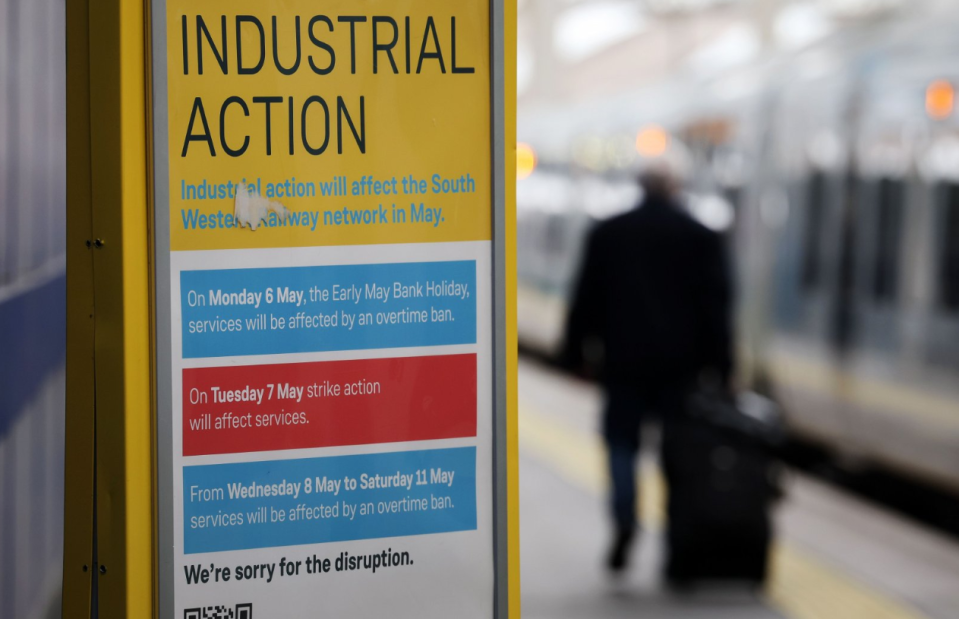Sensitive and fraught union talks a sign of things to come for Labour

- Oops!Something went wrong.Please try again later.
Down an unassuming street in south London the man who could be prime minister within months met leaders of some of the country’s biggest trade unions.
At Labour’s new headquarters in Southwark they were thrashing out what the party would say it would do about conditions at work and the rights of workers if it won the general election.
It gets right to the heart of one of the most important dynamics an incoming Labour government would juggle: its relationship with business and its relationship with, well, labour – i.e workers.
For a party born out of the unions, seeking office in a world where union influence is shrunken, there is a dilemma and it involves trade-offs.
A desire to be true to its heritage but a desire too to win and to win over recent Tory voters among whom there may be few union members and even suspicion of their influence.
So, will Labour ban zero-hours contracts? What about companies firing and then rehiring? What about the right to switch off, and not be hassled by a boss when you’re not at work?
Back in 2021, which in political terms feels like just after the last Ice Age, Labour published what it called A New Deal For Working People. It was - it still is - described as a Green Paper, which is Westminster speak for a consultation document, the start of a conversation.
It promised to ban zero-hours contracts. It promised “all workers, regardless of sector, wage, or contract type, will be afforded the same basic rights and protections.
"This included - and still does - rights to sick pay, holiday pay, parental leave, protection against unfair dismissal and many others.”
It promised “from day one, a Labour government will strengthen workers" rights and make Britain work for working for people”.
Fast-forward to last summer, when there had been some back-pedalling.
On timing, on practicalities, on specifics.
Some union figures fear yet more back-pedalling still. They thought the party was going wobbly.
They thought businesses had managed to lobby them into watering the whole thing down and, a bit like Labour's about turn in February on green investment, things could end up getting ditched.
A leak to the Financial Times spread the jitters further.

This is the backdrop to the leaders of the 11 trade unions affiliated to the Labour Party turning up at party headquarters to meet Sir Keir Starmer.
The occasion was a gathering of the Trade Union and Labour Party Liaison Organisation or TULO – which does exactly what it says in its title.
But the subject matter was high stakes. General secretaries rearranged their diaries to make sure they were there.
They were on the premises for around five hours, meeting Sir Keir and other senior party figures for around an hour.
Afterwards, an intriguing joint statement from Labour and TULO which said: "Labour and the affiliated unions had a constructive discussion today.
"Together we have reiterated Labour's full commitment to the New Deal for Working People, as agreed in July. We will continue to work together at pace on how a Labour government would implement it in legislation."
Union leaders think this amounts to a retreat from any further tinkering to the plans last altered last summer.
But it appears telling they are meeting again in three weeks' time and unions are yet to see "words on a page" as one figure put it to me.
And neither have we, the wider public.
I understand the meeting was told Labour would introduce an Employment Rights Bill within about three months of winning the election and this would make it illegal for companies to fire their workers only to rehire them on worse pay and conditions.
There would be an exemption if the employer was about to go under.
So there is a get-out clause and it won’t happen instantaneously (which was never likely, but the language of the past suggested it would).
The outright ban on zero-hours contracts has gone. Instead the party wants to ban what it calls “exploitative” zero-hours contracts.
The idea is some people like zero-hours contracts but those who don’t must be offered a contract equivalent to the average hours worked per week over a 12-week period.
And creating a “single status of worker” as initially suggested three years ago, which would mean all workers could be afforded the same basic rights, is actually quite complicated and will need in-depth discussions and consultation that, the party thinks, can only begin once it is in government.
So that is not likely to happen quickly.
Add to that the conventional expectation, again not fleshed out in the original proposal, that big ideas leading to changes in the law almost always begin with a consultation period of around three months, not least to minimise the likelihood of later legal challenges.
But all of this adds to a sense of delay, which spooked some union leaders.
And so the conversation continues.
Not just a conversation with trade union leaders but employers too – as the wider public watches, listens and forms judgements, as judgement day for Labour approaches at the ballot box.
Little wonder these conversations are sensitive, fraught and not easily resolved.
And there are more of them to come before we find out precisely what Labour is promising.

